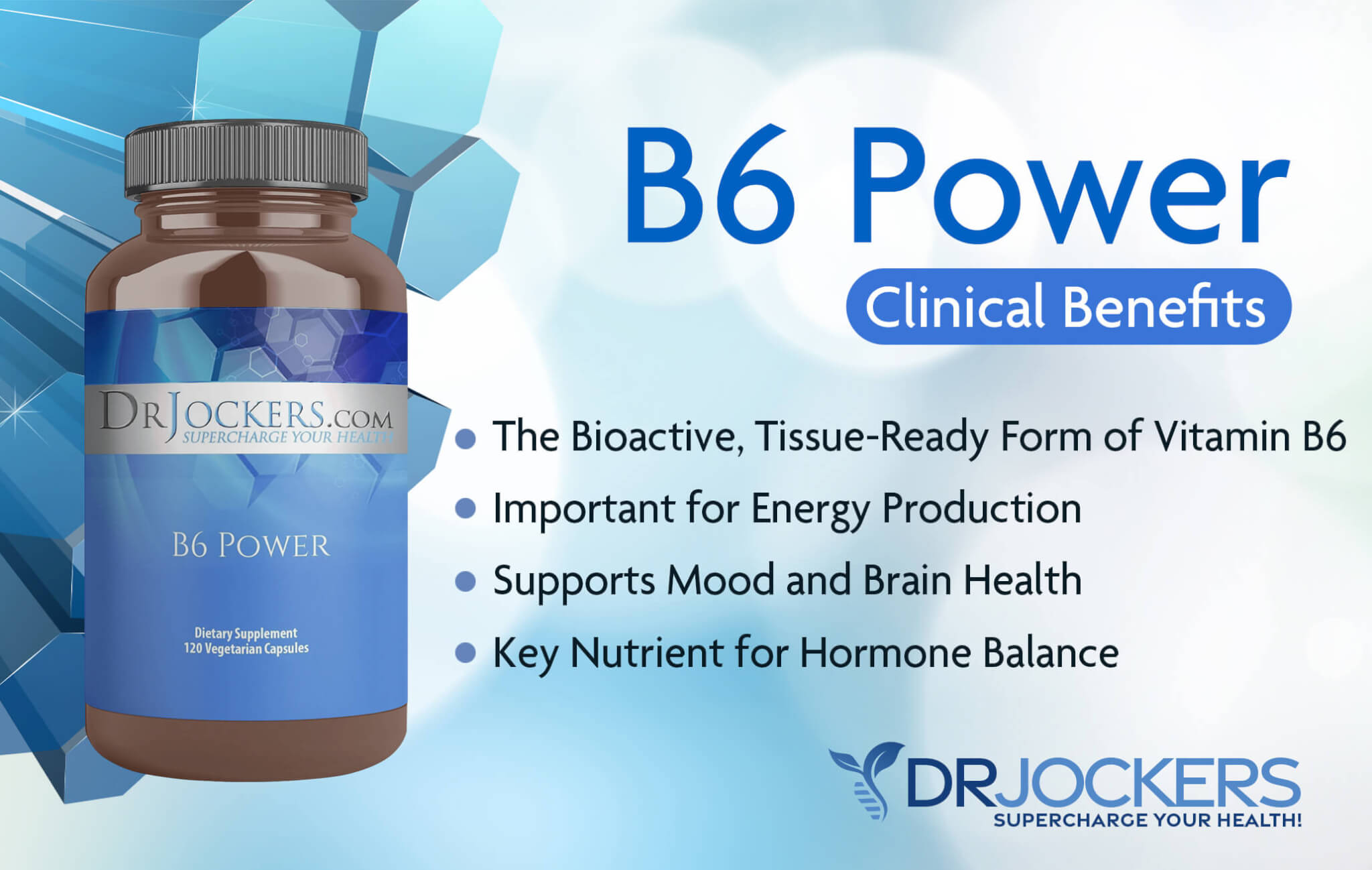 Vitamin B6 Deficiency: Symptoms, Causes, and Solutions
Vitamin B6 Deficiency: Symptoms, Causes, and Solutions
Vitamin B6, also known as pyridoxine, is one of the B vitamins that your body needs for proper cell function. It is essential for metabolism, brain health, hormone balance, and healthy inflammation levels. Vitamin B6 deficiencies may increase your risk of various health issues. Ensuring proper vitamin B6 levels is critical.
In this article, you will learn what vitamin B6 is. You will understand the symptoms of vitamin B6. I will discuss the risk factors for vitamin B6 deficiency. I will go over the key functions of vitamin B6. I will share the lab testing I recommend for vitamin B6 deficiency.
You will learn about the RDA amounts for vitamin B6. I will go over the top 10 foods for improving your B6 levels. You will learn about vitamin B6 supplementation and the best forms of supplements. I will go over the best dosage for vitamin B6 and the risk of toxicity. Finally, I will recommend my favorite vitamin B complex and vitamin B6 supplements to improve your levels.
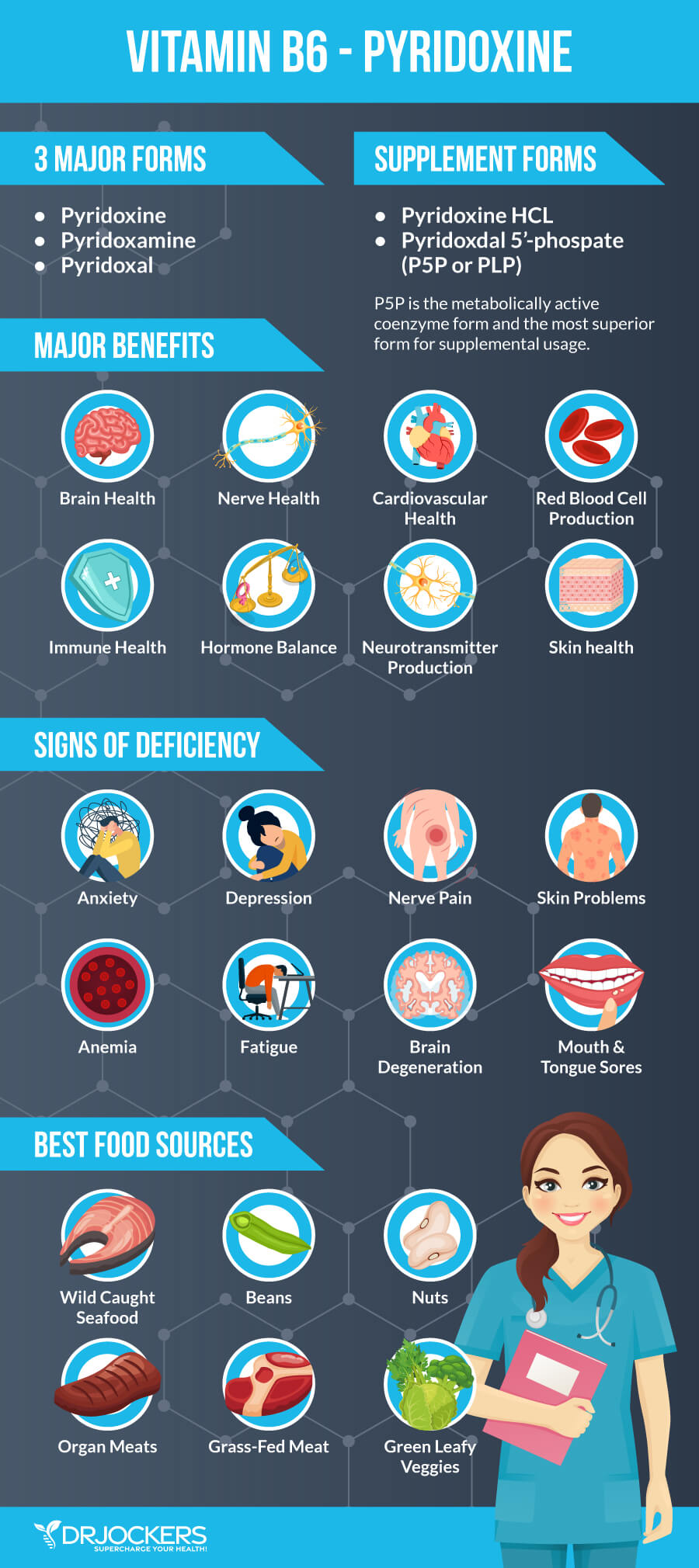
What is Vitamin B6
Vitamin B6, also known as pyridoxine, is one of the B vitamins that your body needs for proper cell function. It is a water-soluble vitamin. This means it dissolves in water and you can take it without fat. Fat-soluble vitamins need some fat to absorb properly. Since your body cannot store extra vitamin B6 and removes any excess through urine, you need to get vitamin B6 through food and/or supplementation on a daily basis.
Just like many other B vitamins, vitamin B6 is critical for your central nervous system, cellular function, and metabolism. It helps to make neurotransmitters, including dopamine and serotonin. It also helps metabolize protein, fats, and carbohydrates from food and turn them into energy.
It helps create new blood cells and keep your cell healthy. It also plays an important role in over 100 enzyme reactions. It is essential for brain development during pregnancy and infancy. It also supports the immune system. In the later sections, you will learn about the benefits of vitamin B6 (1, 2).
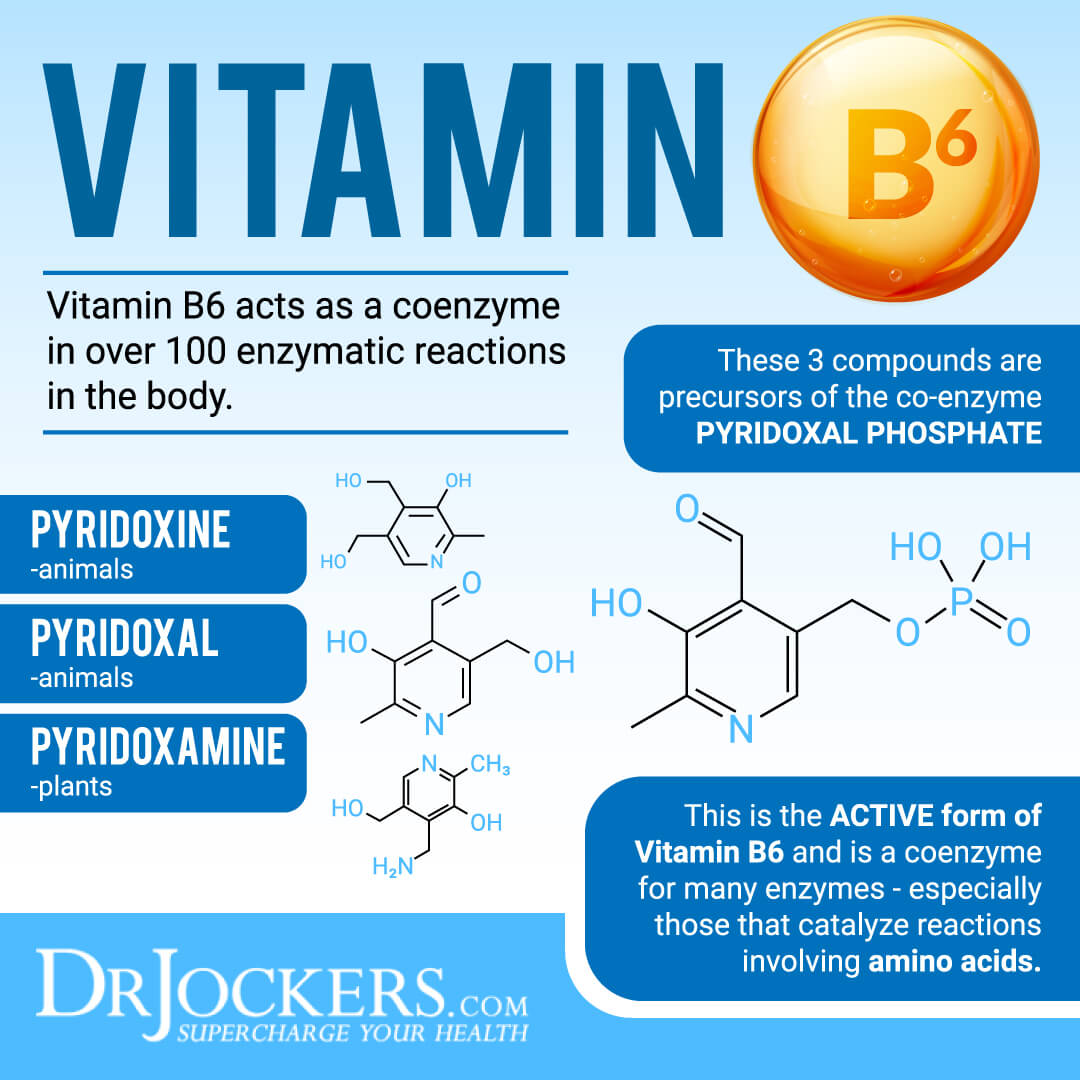
Symptoms of Vitamin B6 Deficiency
Symptoms of a vitamin B6 deficiency may vary from person to person. People with borderline or mild vitamin B6 deficiency may not have symptoms for months or even years, or you may mistake these symptoms for other health issues (2).
Symptoms of a vitamin B6 deficiency may include:
- Depression
- Confusion
- Microcytic anemia
- Poor Dream Recall
- Dermatitis with cheilosis
- Poor immune function
- MSG sensitivity
- Poor caffeine metabolism (coffee makes them jittery)
- Poor glucose tolerance
- Calcium oxalate kidney stones
- Nausea and water retention during pregnancy
- Abnormally acute hearing in infants
- Convulsive seizures in infants
- Irritability in infants
- Asthma
- Epilepsy
- Visual Disturbances
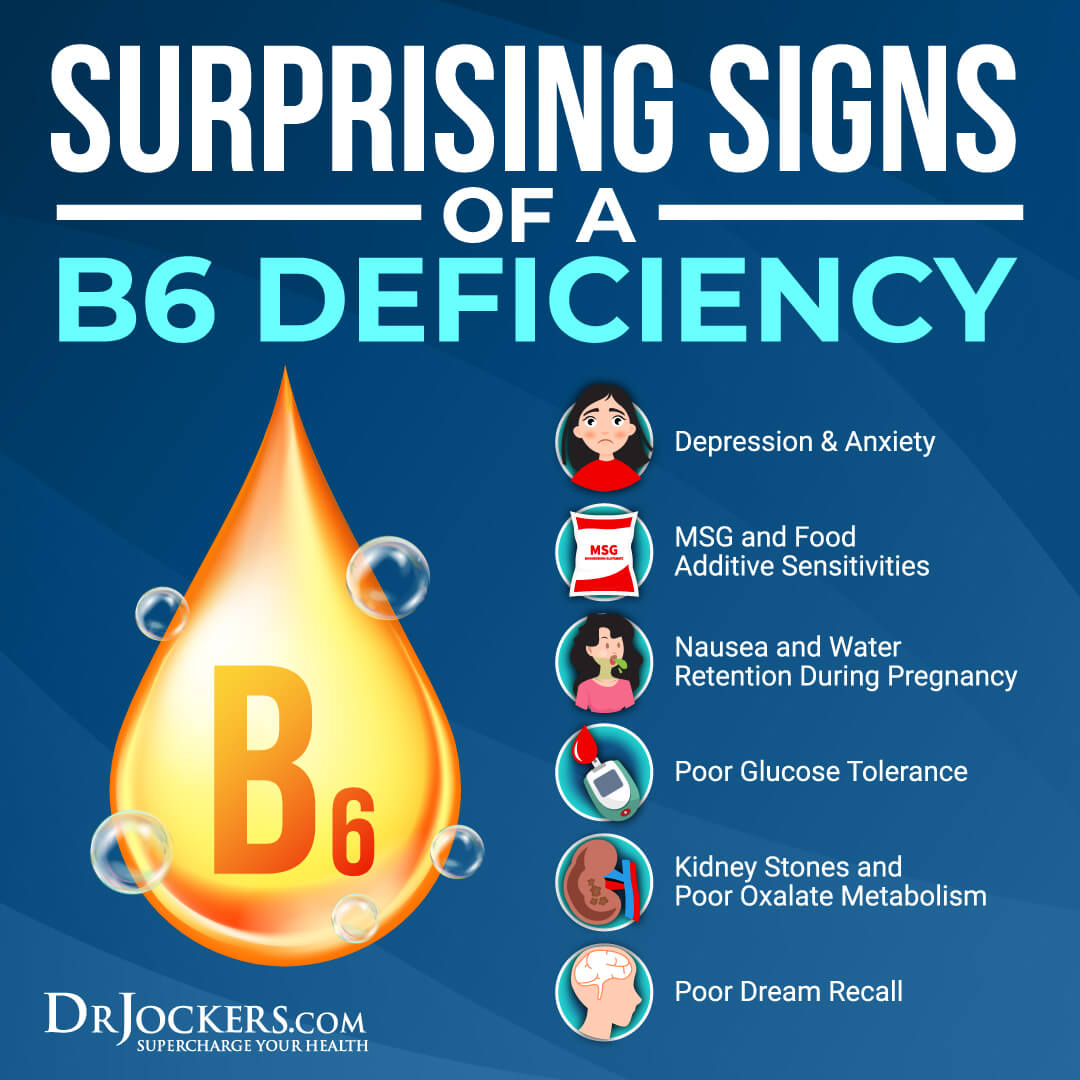
Risk Factors for Vitamin B6 Deficiency
Older individuals, people with renal problems, people with alcohol use disorder, and those with vitamin malabsorption issues are at a higher risk for developing vitamin B6 deficiency. People living in less developing countries or in poverty without access to good nutrition and healthcare are at increased risk as well.
Serious vitamin B6 deficiency can be the result of chronic renal insufficiency, end-stage renal diseases, and other kidney diseases.
It may develop as a result of malabsorption from certain gut health issues, such as Celiac disease, ulcerative colitis, and Crohn’s disease. You may also develop serious B6 deficiency from homocystinuria and other genetic diseases (2, 3).
There are also a number of B6 antagonists that deplete the body of vitamin B6 and these include oral contraceptives, alcohol, many prescription drugs, estrogens, yellow food dye consumption and various environmental pollutants.
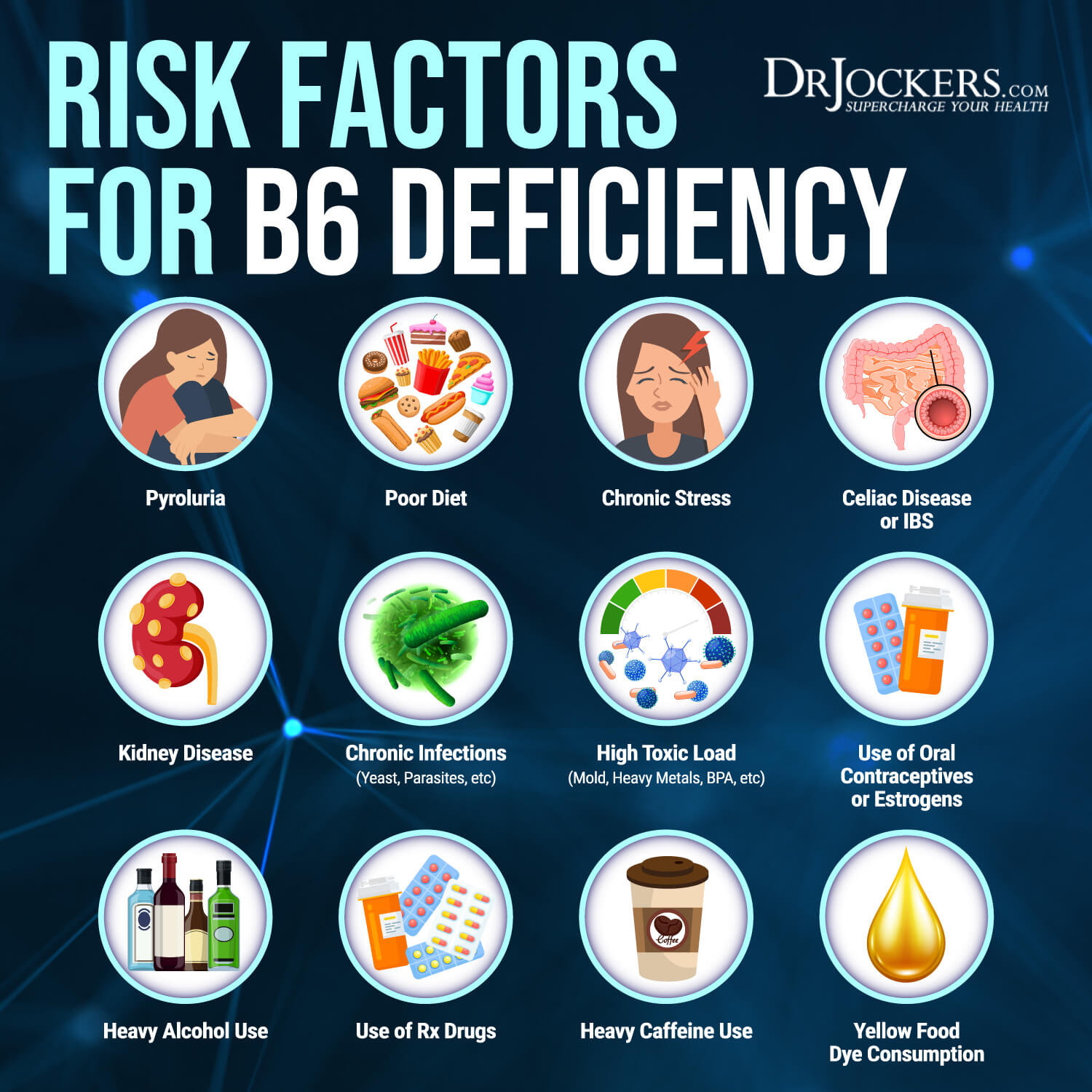
Pyroluria and Vitamin B6 Levels
Pyroluria, also called Malvaria, is another issue that may be connected to low vitamin B6 levels. It is a unique metabolic condition that is very rarely recognized in both the medical and natural health world. Some researchers in orthomolecular medicine and orthomolecular psychiatry believe that up to 10 percent of the population has pyroluria.
In the functional medicine world, it is considered one of the most common unknown disorders. People with pyroluria need a specific diet, lifestyle, and supplementation program to get well. Vitamin B6 is one of the nutrients because of deficiencies.
Pyroluria is a genetic health condition that is usually related to familial alcoholism and/or environmental toxicity. If an individual has a family history of alcoholism, they may also have this genetic mutation. Childhood trauma or chronic infection early in life may also increase the risk of the condition.
The onset tends to be in the late teens and is often triggered by a traumatic life event. Symptoms of pyroluria may include chronic fatigue, depression, poor memory, poor immune health, ADHD, bipolar symptoms, and schizophrenia.

The Pathophysiology of Pyroluria
So how is pyroluria connected to vitamin B6 levels? There are several waste products that are produced when the body makes hemoglobin for the red blood cells. These waste products are called kryptopyrroles which are technically called hydroxyhemop pyrrolin-2-one (HPL) which are typically excreted by our body. Individuals with pyroluria are unable to clear the HPL effectively and they build up in the system (4, 5).
The HPL binds strongly to zinc, biotin, and vitamin B6, which are critical nutrients for cellular metabolism. Remember, there is a buildup of HPL in pyroluria. Excess HPL will hold on to B6 and these other vitamins instead of allowing your body to use it. Over a period of time, the body becomes very deficient in these critical nutrients, and symptoms arise.
These people will often go years suffering the effects of this disorder despite a clean diet, supplementation, and holistic therapies. If you are following a healthy diet and lifestyle and other holistic strategies and use supplementation and still dealing with vitamin B6 deficiencies, this may be a condition to look into. You can learn about pyroluria by reading this article.
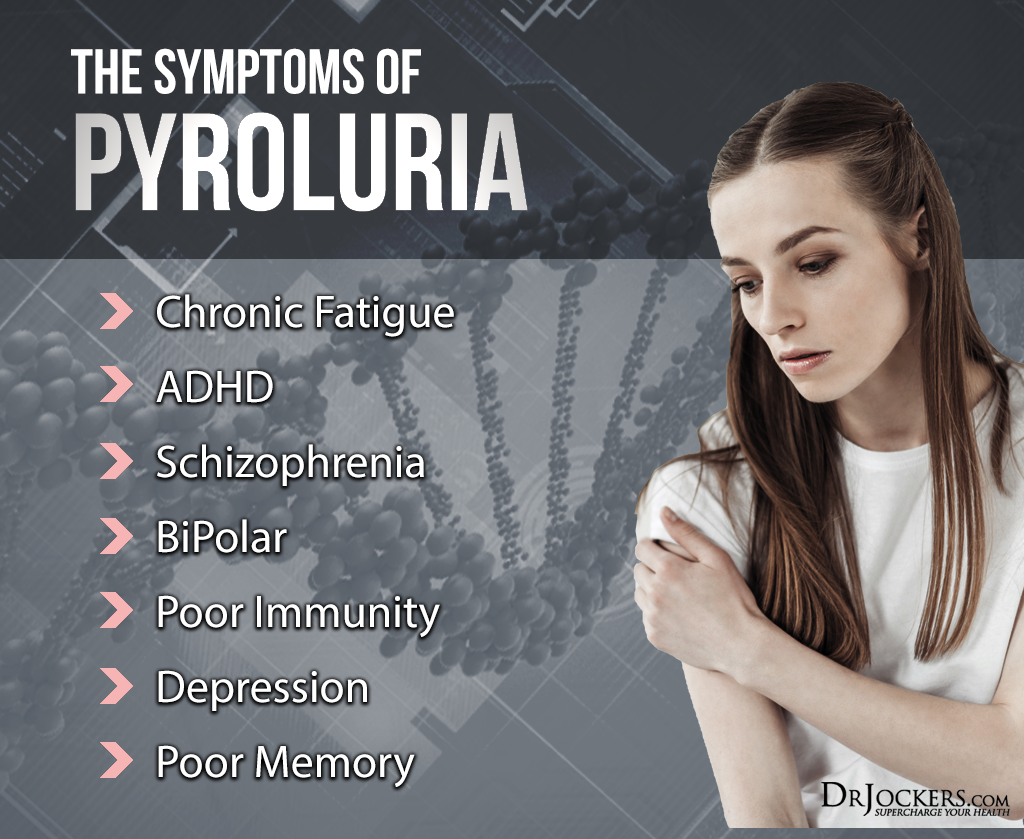
Key Functions of Vitamin B6
Let’s learn about the key functions of vitamin B6 before discussing testing and supplementation.
Production of Stomach Acid
Vitamin B6 may play a role in the production of stomach acid and supplementation may help to improve stomach acid levels. A 2006 study published in the Journal of Pineal Research has found that vitamin B6 may help to reduce symptoms of acid reflux (6). Vitamin B6 deficiency often comes together with deficiencies in other B vitamins, including vitamin B9 (folate) and vitamin B12.
Moreover, your body requires stomach acid to properly absorb vitamin B12. Poor stomach acid levels as a result of vitamin B6 deficiency or other factors can lower vitamin B12 absorption, further feeding the cycle of deficiencies, poor stomach acid, and acid reflux.
Supplementing with folate and vitamin B12 alongside vitamin B6 may also help to improve stomach acid levels and decrease acid reflux (6). According to a 2013 study published in the Journal of Nutrition, B vitamins, including B6 and B12, may lower the risk of stomach acid-related esophagus issues, such as reflux esophagitis, esophageal adenocarcinoma, and Barrett’s esophagus (7).
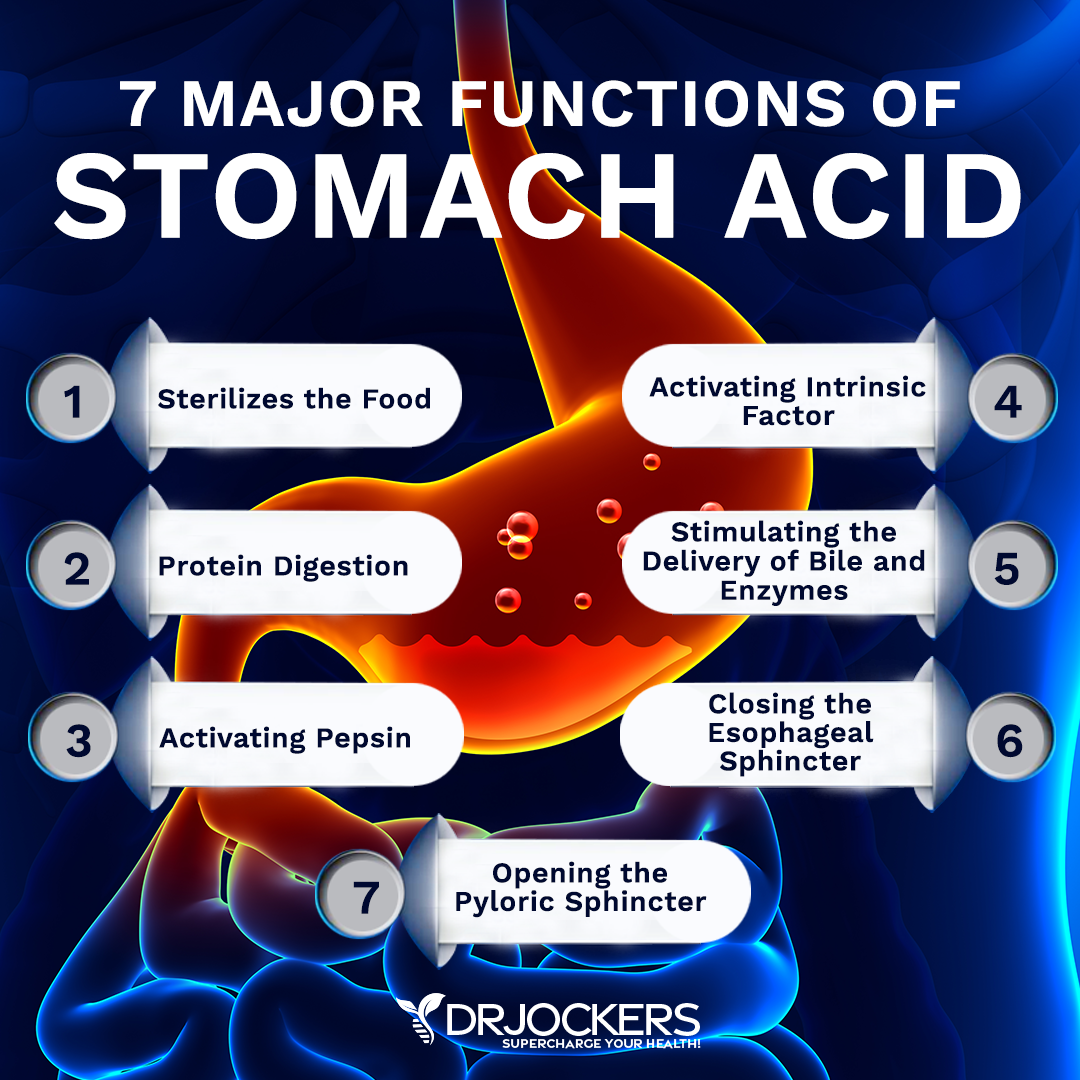
Cellular Energy Production and Metabolism
Vitamin B6 plays an important role in energy production and your metabolism. It helps your body to turn food into energy. According to a 2018 review published in Cells, vitamin B6 plays a role in cell metabolism (8).
It plays a role in amino acid metabolism, the biosynthesis of various vitamins, and cellular homeostasis. According to a 2021 review published in Nutrients, vitamin B6 is involved in over 150 biochemical reactions, the metabolism of fats, protein, and carbohydrates, and cellular signaling (9).
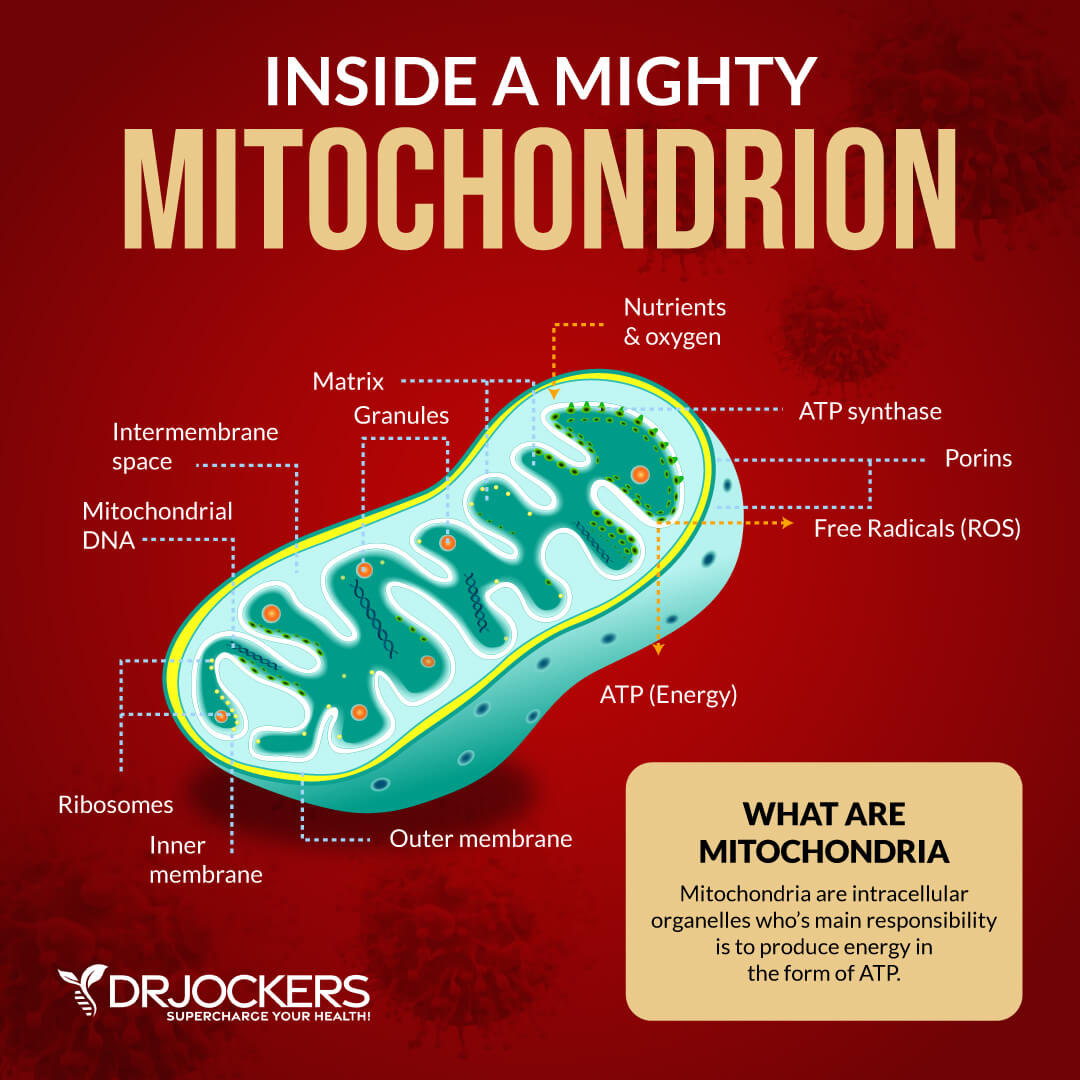
Neurotransmitter Production
Vitamin B6 also plays a role in your brain and mental health. This vitamin helps to make neurotransmitters, which are vital chemical messengers in your brain. They help communication and energy regulation within your brain. According to a 2016 review published in Nutrients, vitamin B6 and other B vitamins play a role in brain function, energy production needed for brain function, and the synthesis of neurochemicals and signaling molecules (10).
Vitamin B6 deficiency may increase the risk of cognitive decline and dementia, and supplementation may help. According to a 2022 study published in Human Pharmacology: Clinical and Experimental, vitamin B6 may also help to reduce anxiety and depression (11).
When it comes to B6 and neurotransmitter production, we also have to talk about Gamma-Amino Butyric Acid or GABA. GABA receptors are spread out throughout the brain and they are ligand-activated chloride channels that when activated, allow the negatively charged chloride ions across the cell membrane and into the cell, where they reduce cellular activity.
GABA is synthesized from the amino acid glutamate with the enzyme glutamate decarboxylase (GAD) and pyridoxal phosphate (which is the activated form of vitamin B6) as the key cofactor. This process converts glutamate, which is the principal excitatory neurotransmitter in the brain, to the principal inhibitory neurotransmitter GABA. GABA may help to modulate the amount of human growth hormone release and the synthesis of the sleep hormone melatonin (12, 13).
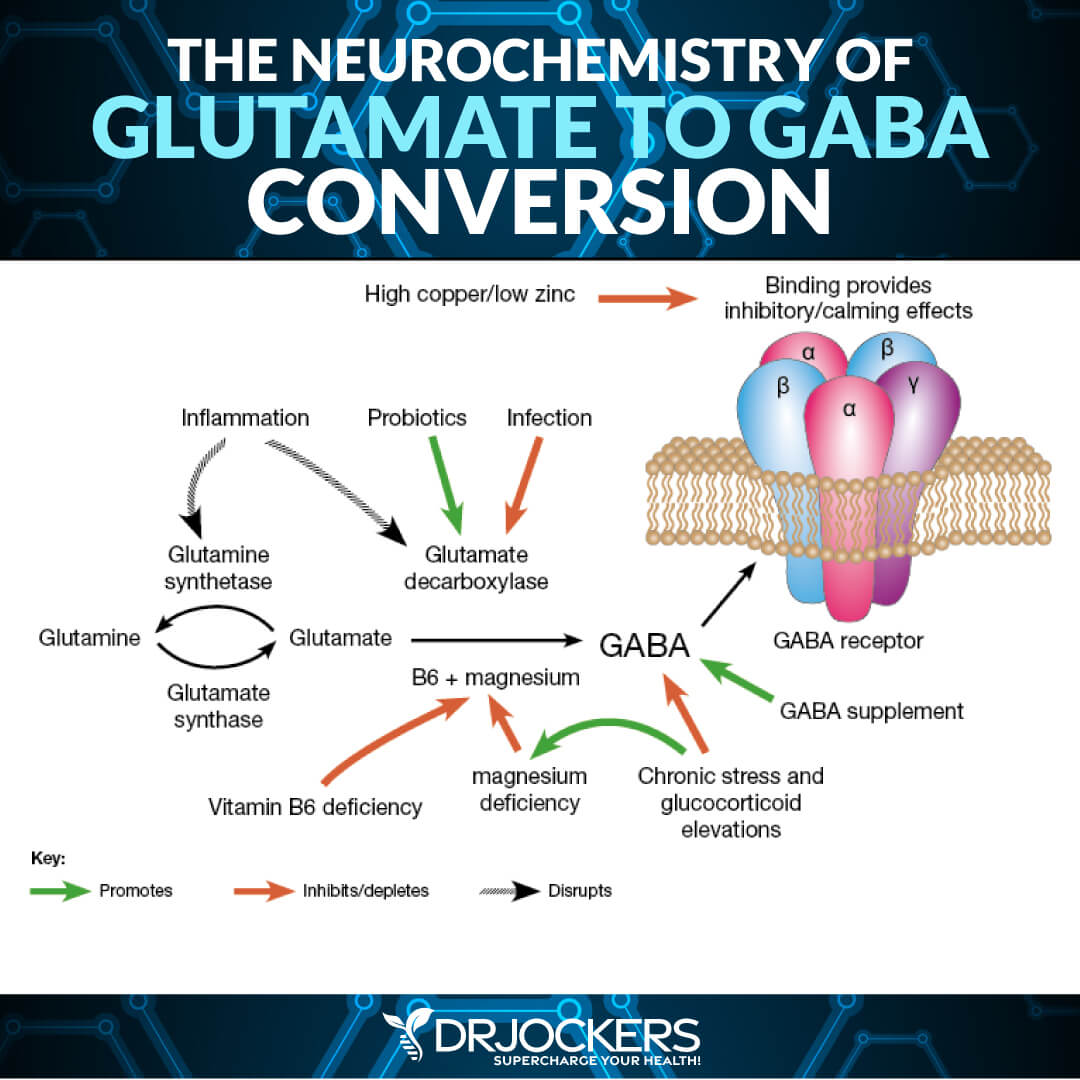
Hormone Balance
Vitamin B6 also plays a role in hormone balancing. It may particularly be helpful for women at a reproductive age. According to a 2016 review published in JAMA Network, vitamin B6 supplementation may help to reduce nausea and vomiting associated with morning sickness during pregnancy (14).
Vitamin B6 supplementation is also recommended by the American Congress of Obstetricians and Gynecologists (ACOG) for nausea during pregnancy (15).
Vitamin B6 may also be helpful for reducing symptoms of premenstrual syndrome (PMS). According to a 1989 study published in the Journal of the Royal College of General Practitioners, B6 may help to reduce irritability, depression, and fatigue linked to PMS (16). A 2000 study published in the Journal of Women’s Health and Gender-Based Medicine has also found that B6, along with magnesium, may be effective for PMS (17).
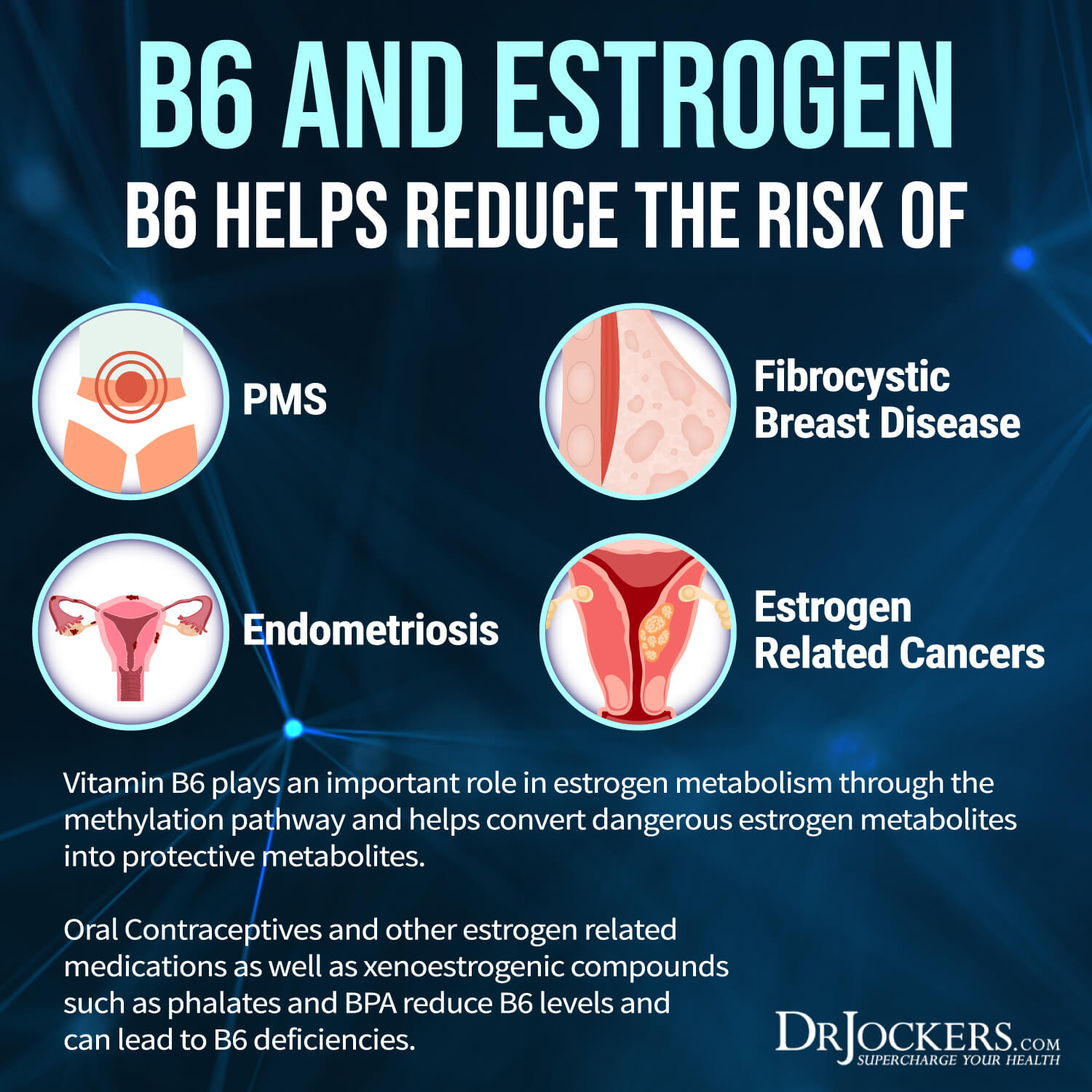
Inflammation Control
Vitamin B6 may also help to reduce inflammation. According to 2010 research published in the Journal of Nutrition, adequate vitamin B6 levels are essential for reducing the risk of chronic inflammation (18). According to a 2018 review published in Advanced Food and Nutrition Research, low B6 may increase the risk of inflammation, obesity, chronic health issues, and carcinogenesis (19).
According to a 2003 study published in the American Journal of Medicine, chronic inflammation related to rheumatoid arthritis may increase the risk of low b6 levels (20). According to a 2010 study published in the European Journal of Clinical Nutrition, vitamin B6 supplementation may reduce inflammation associated with rheumatoid arthritis (21).
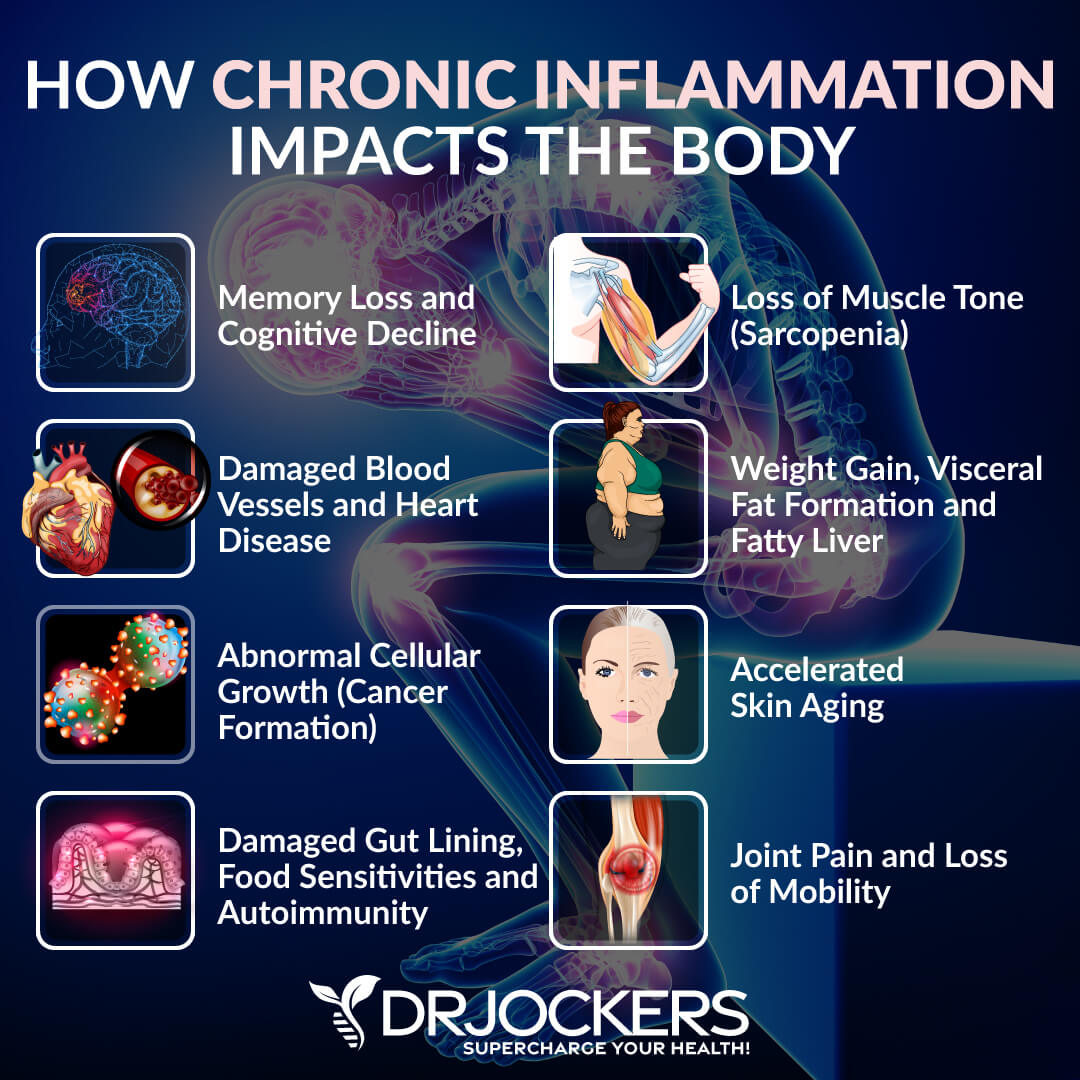
Creation of Structural Proteins
Vitamin B6 may also help to create structural proteins. According to a 2018 study published in Cells, B6 plays a role in protein folding (8).
Protein folding refers to a process where a protein chain is changed into its native three-dimensional structure. Pyridoxal 5′-phosphate (PLP) is the biologically active form of vitamin B6 and plays a role in the folding of protein enzymes.
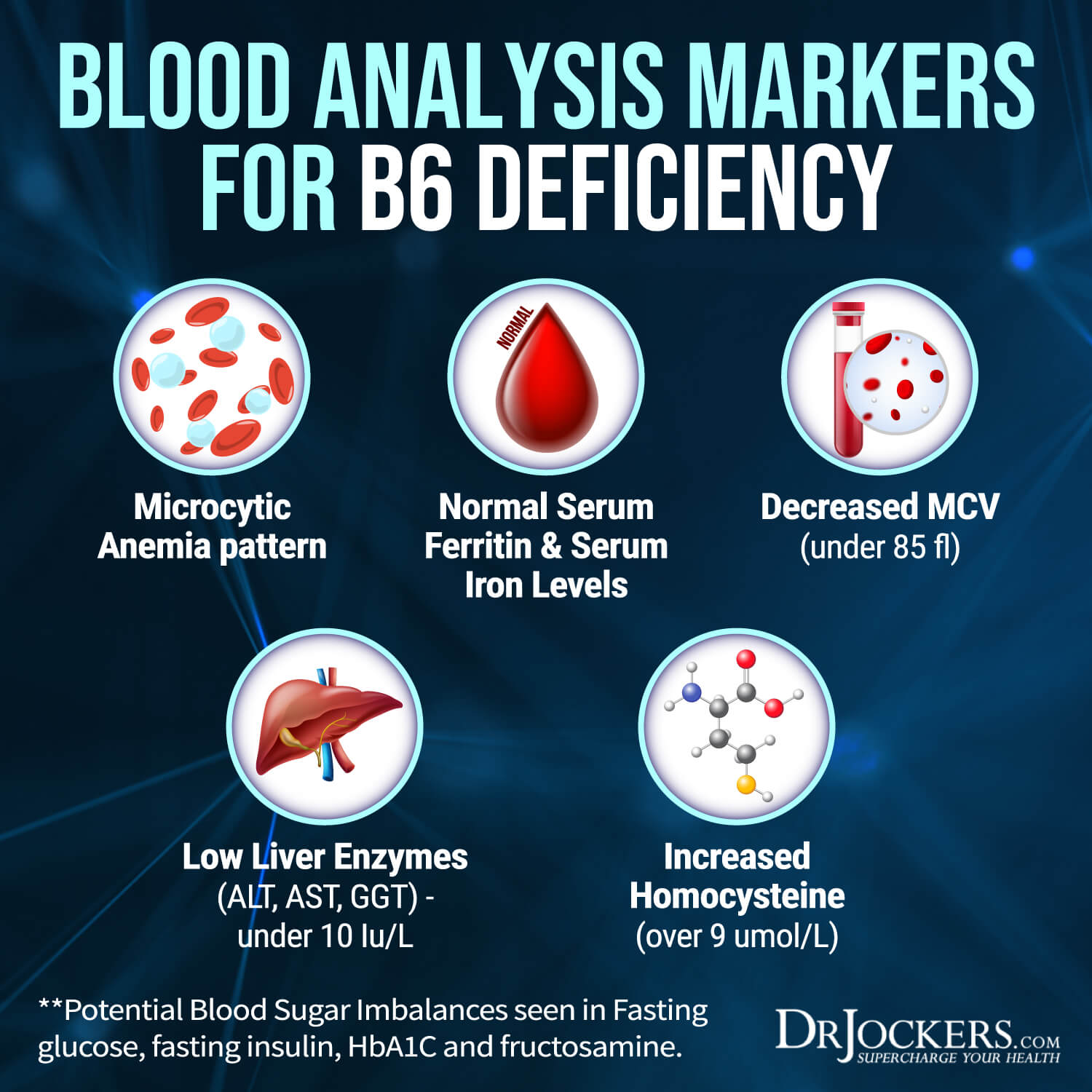
Lab Testing for Vitamin B6 Deficiency
To test for vitamin B6 deficiency, risks, and related health issues, I recommend a few lab tests.
Liver Enzymes
Alanine aminotransferase (AST) is a liver enzyme. When the liver is stressed, these enzymes go up. If you have a sluggish liver or gallbladder, you may present with elevated AST levels. Normal levels are between 10 and 26 IU/L.
Aspartate transaminase (ALT) is an enzyme present in the liver that spills out during times of increased liver stress. Elevated ALT levels may indicate poor liver or gallbladder health. Normal levels are between 10-21 IU/L.
Gamma-Glutamyl Transpeptidase (GGT) is an enzyme in the liver, pancreas, and kidneys. It is elevated in all forms of liver disease and functionally increased due to alcoholism and/or sluggish gallbladder or gallstone obstruction. Normal levels are between 10 and 26 IU/L. Levels lower than 10 IU/L can be an indication of a vitamin B6 deficiency.
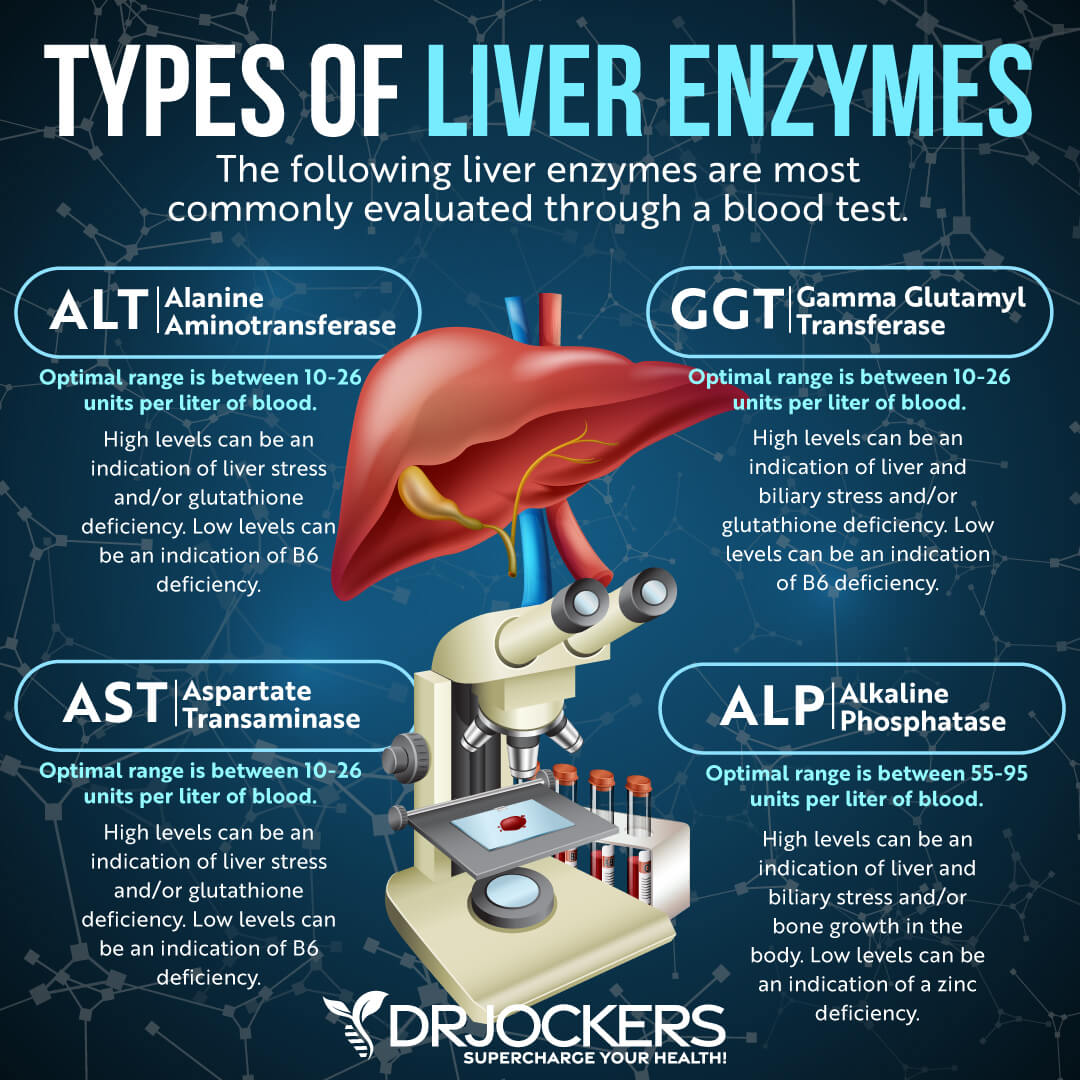
Blood Cell Formation
I also recommend looking at the microcytic anemia pattern which may occur with normal ferritin and serum iron levels in a B6 deficiency. While an iron deficient microcytic anemia you will have low RBC, HgB and MCV it will also have low ferritin and serum iron levels which differentiates it from the B6 deficiency anemia.
With a B6 anemia, you will see a microcytic pattern with the red blood cells, hematocrit, and the mean corpuscular volume and possibly the MCH and MCHC. The difference is that it will have the normal ferritin and serum iron levels. Other markers I look for on a B6 anemia pattern include increased homocysteine (over 9), decreased liver enzymes ALT, AST and GGT (under 10).
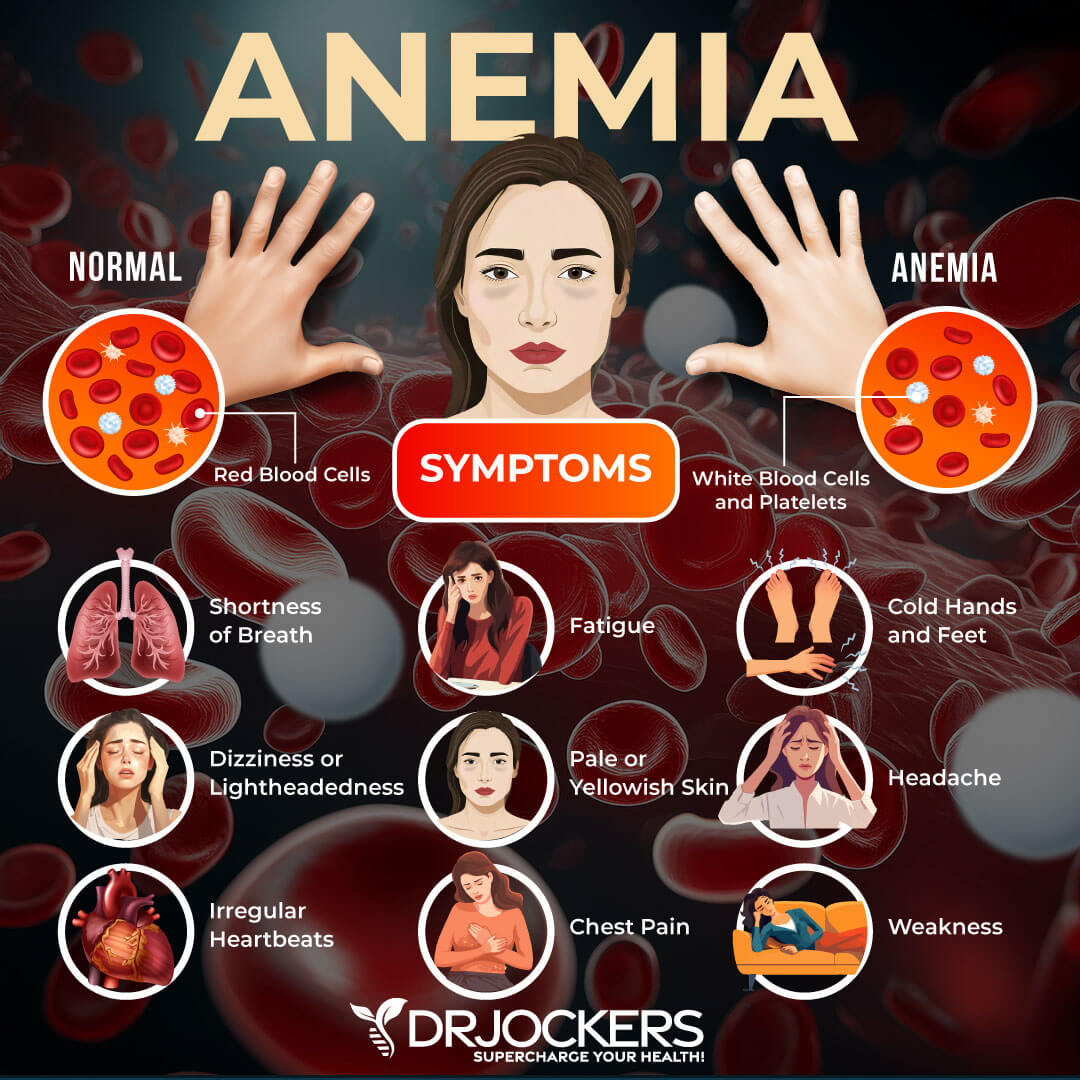
High Homocysteine
Homocysteine is a common amino acid in your blood that you mostly get from eating meat. Homocysteine is particularly a good marker for cardiovascular issues.
Elevated homocysteine levels may indicate inflammation and low vitamin B6 levels. The optimal range for homocysteine is between 6 and 9.

Blood Sugar Metabolism Markers
Blood sugar imbalances may increase your risk of inflammation. Fasting glucose levels can indicate blood sugar issues and metabolic problems. Fasting glucose levels check for blood glucose levels after an overnight fast. The clinical range is 99 mg/DL or lower. 100 to 125 mg/dL indicates prediabetes, and 126 mg/dL or higher is a sign of diabetes. In vitamin B6 deficiency, we tend to see high levels.
Testing your fasting insulin can recognize elevated blood sugar levels and can detect inflammation, insulin resistance, blood sugar issues, and diabetes. The clinical range for fasting insulin is 2.6 – 24.9 uIU/ml, and the optimal range is 1.0 – 5.0 uIU/ml. Your HbA1C levels measure your average blood sugar over the past 2 to 3 months. In vitamin B6 deficiency, we tend to see high levels.
Hemoglobin A1C (HbA1c) gives the average amount of glucose in your blood or blood sugar over the past 3 months, making it one of the top tests for inflammation and diabetes. The clinical range is between 4.8 and 5.6 while the optimal range is 4.5 – 5.2. In vitamin B6 deficiency, we tend to see high levels.
I also recommend looking at fructosamine levels. Fructosamine is a type of glucose that binds to other proteins. This test helps to determine if you have or are at risk of diabetes. The clinical range is 200 to 285 umol/L. In vitamin B6 deficiency, we tend to see high levels.
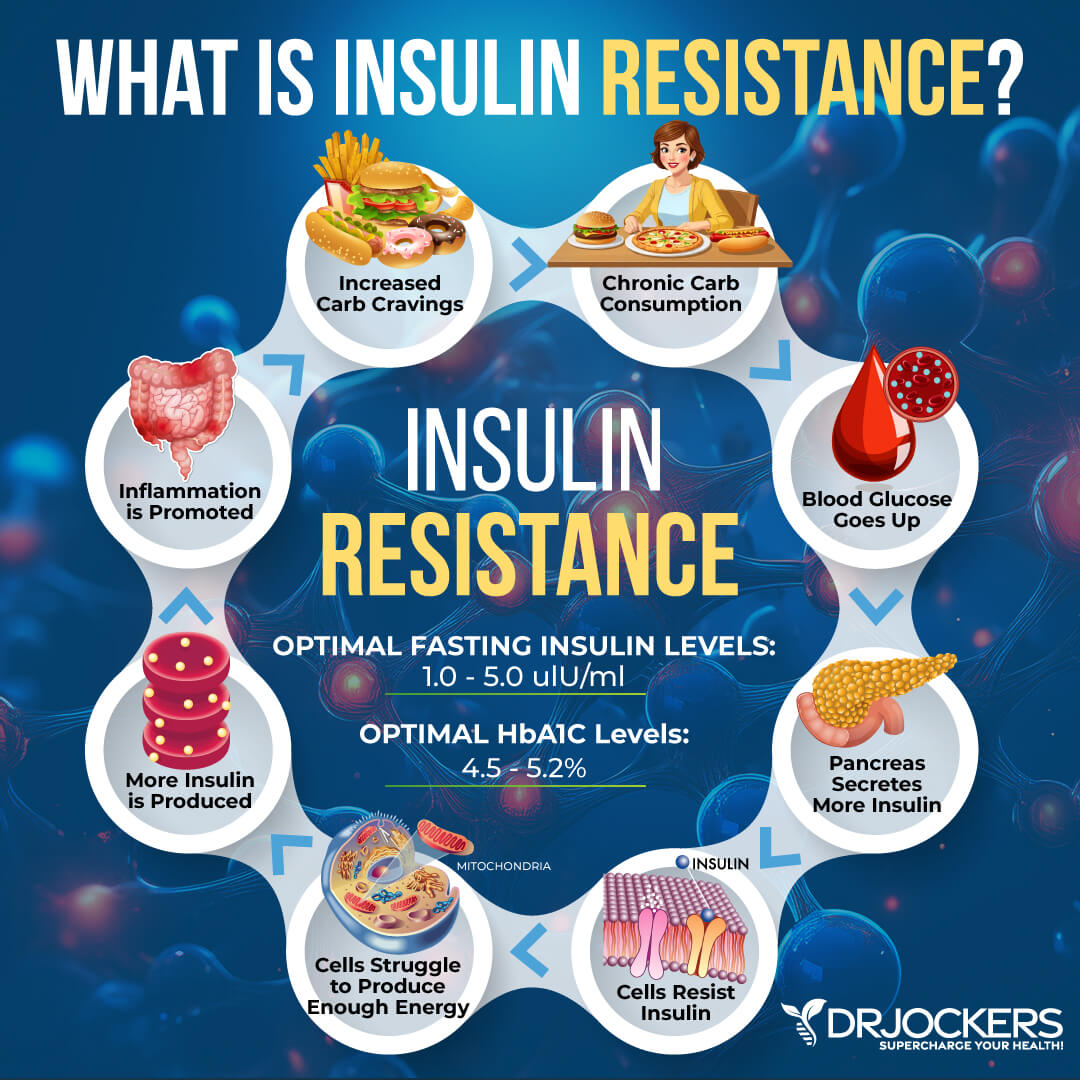
Comprehensive Blood Analysis
To check for these health markers, I recommend a Comprehensive Blood Analysis (CBA). This is the most detailed blood test that looks at all of these markers of inflammation. This test is more sophisticated than most conventional doctors are able to order.
It examines all parameters for inflammation, blood sugar levels, thyroid function, zinc and copper ratio, vitamin A and D levels, a complete metabolic panel, complete blood count, liver function, nutrient deficiencies, and more. I recommend getting the Comprehensive Blood Analysis done regularly both as a preventative measure and to monitor your inflammation levels and progress.
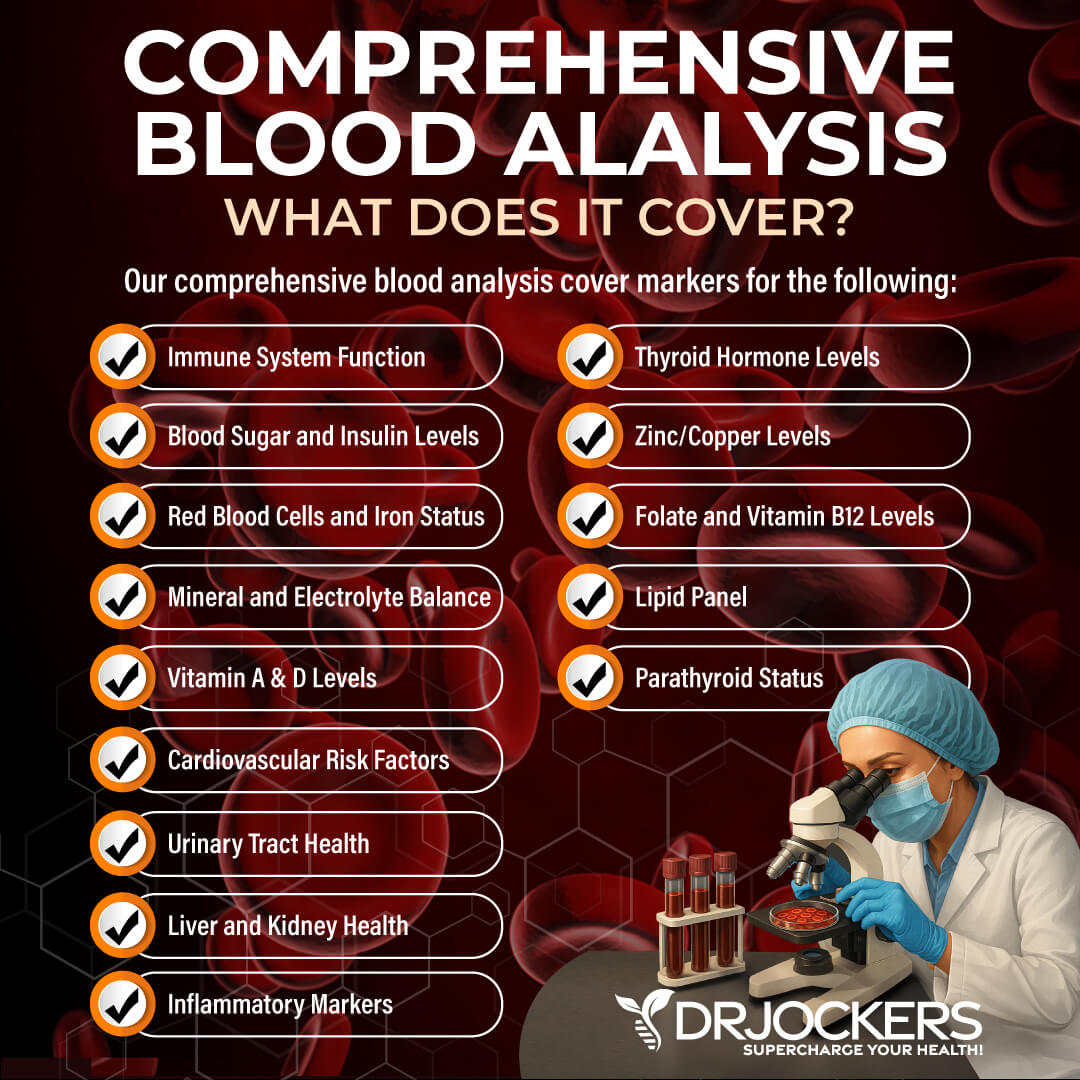
Organic Acid Test
I also recommend a Comprehensive Organic Acid Test to look at vitamin B6 and other markers. The Comprehensive organic acids test is my personal favorite test as it gives a plethora of information on what is going on in the body and is non-invasive on the individual.
This is a simple urine test that looks at complex biomarkers from various metabolic pathways. These biomarkers give an overview of several major systems in the body and an analysis of nutritional deficiencies in the body. Many functional medicine practitioners believe the organic acids test provides the most useful data for the dollar spent on any metabolic test. T
he organic acid biomarkers are metabolic intermediates that are produced in pathways of central energy production, neurotransmitter breakdown, detoxification, and intestinal microbial activity. When specific organic acids are found accumulating, they often signal a metabolic insufficiency.
These insufficiencies could be related to toxicity, a nutritional deficiency, or an inherited enzyme deficit. From this test, we can learn so much about your health, including vitamin deficiencies. For vitamin B6 issues, I recommend looking at B6 marker #51 – Pyridoxic.
RDA Amounts for Vitamin B6
The Recommended Dietary Allowance (RDA) for nutrients refers to the average daily level of “intake sufficient to meet the nutrient requirement of nearly all (97 – 98 percent) healthy individuals” according to the NIH (2). It is generally used to plan a diet that’s nutritionally adequate.
However, the RDA for B6 and most other nutrients is too low, according to functional medicine practitioners. These recommendations are especially low for those with the risk factors for deficiency or having a deficiency in vitamin B6.
This being said, here are the RDA amounts for vitamin B6. Please, know, you likely need higher amounts to reduce the risk for or improve deficiencies (2):
- Birth to 6 months: 0.1 mg for both male and female
- 7 to 12 months: 0.3 mg for both male and female
- 1 – 3 years: 0.5 mg for both male and female
- 4 – 8 years: 0.6 mg for both male and female
- 9 – 13 years: 1.0 mg for both male and female
- 14 – 18 years: 1.3 mg for male, 1.2 mg for female, 1.9 mg during pregnancy, and 2.0 mg during breastfeeding
- 19 – 50 years: 1.3 mg for male, 1.3 mg for female, 1.9 mg during pregnancy, and 2.0 mg during breastfeeding
- 51+ years: 1.7 mg for male, 1.5 mg for female
Best Foods to Raise Vitamin B6 Levels
The best food to raise your vitamin B6 levels include (2):
- Canned chickpeas: 1.1 mg per serving (1 cup)
- Pan-fried beef liver: 0.9 mg per serving (3 oz)
- Fresh, cooked yellowfin tuna: 0.9 mg per serving (3 oz)
- Cooked sockeye salmon: 0.5 mg per serving (3 oz)
- Roasted chicken breast: 0.5 mg per serving (3 oz)
- Boiled potatoes: 0.4 per serving (1 cup)
- Roasted turkey, meat only: 0.4 mg per serving (3 oz)
- Banana: 0.4 mg per serving (1 fruit)
- Ground beef patty, 85% lean: 0.3 mg per serving (3 oz)
- Winter baked squash: 0.2 mg per serving (1/2 cup)
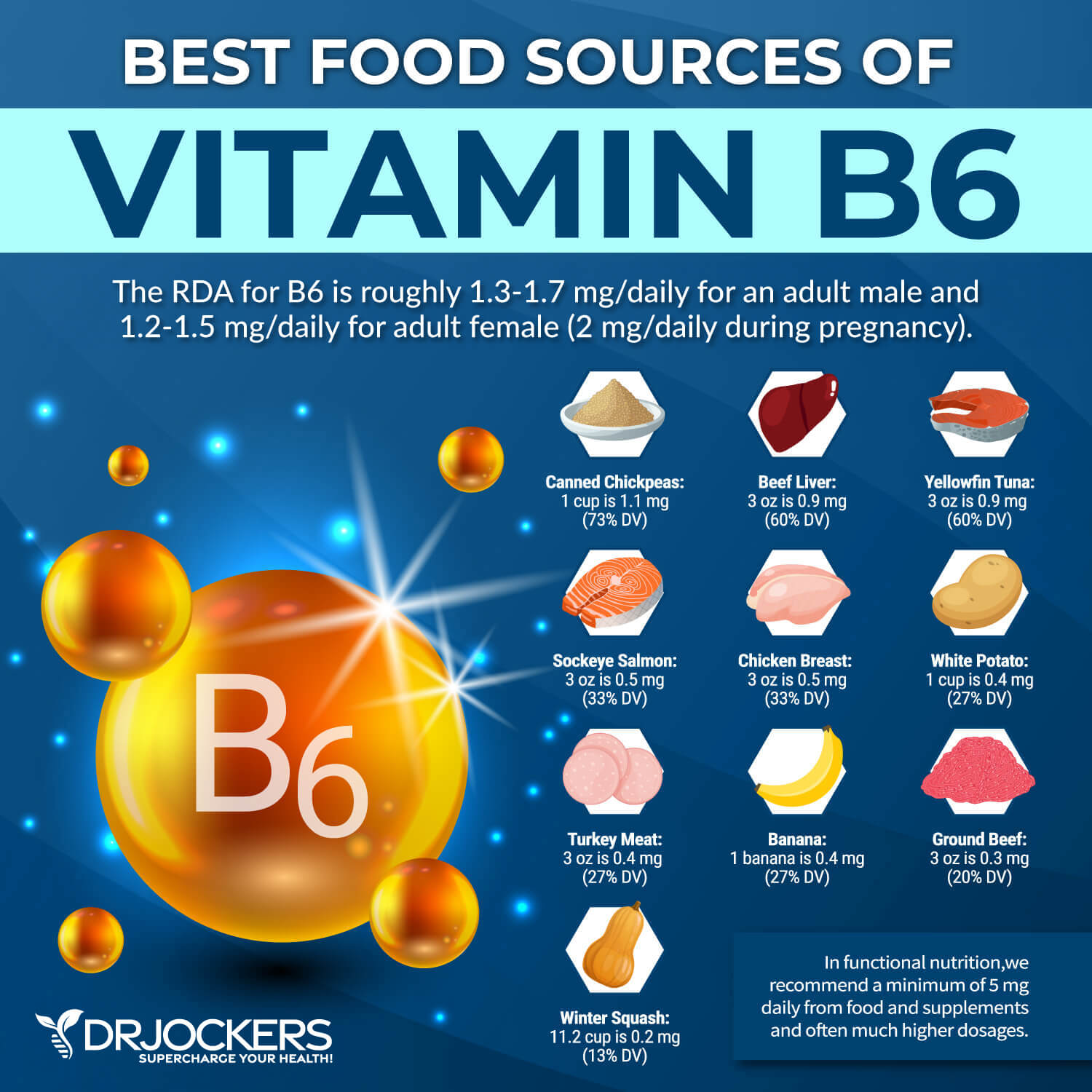
Supplementing B6 Levels
Food alone may not be enough to improve your vitamin B6 levels, especially if you are at risk of or currently dealing with symptoms of vitamin B6 deficiencies or chronic health issues. You may benefit from vitamin B6 supplementation. Here is what I recommend:
Pyridoxine Paradox
The most common form of vitamin B6 that is sold on the market is in the form of Pyridoxine hydrochloride (PNHCl). But in order for pyridoxine to be used by the body, it must first be converted to pyridoxal 5′-phosphate (P5P), a process that takes place in the liver. Individuals with compromised liver function have difficulty making this conversion and consequently may be at risk of a vitamin B6 deficiency.
According to a 2017 study published in Toxicology In Vitro, supplementing with high concentrations of pyridoxine may cause vitamin B6 deficiency (21). Yes, that’s right, despite taking vitamin B6, you may end up with a vitamin B6 deficiency if you are taking PNHCI. I recommend another form of vitamin B6 called P-5-P.
Best Form – P-5-P
When compared with pyridoxal-5-phosphate (P-5-P) supplements, PNHCl requires an additional enzymatic step in the liver to be converted to the form utilizable by the body.
Many practitioners, including myself, recommend P-5-P supplements over PNHCl supplements for this reason, and because there have been more reports of adverse effects with the use of high doses of pyridoxine. This is the form found in the supplements I will be recommending in this article: B Strong and B6 Power.
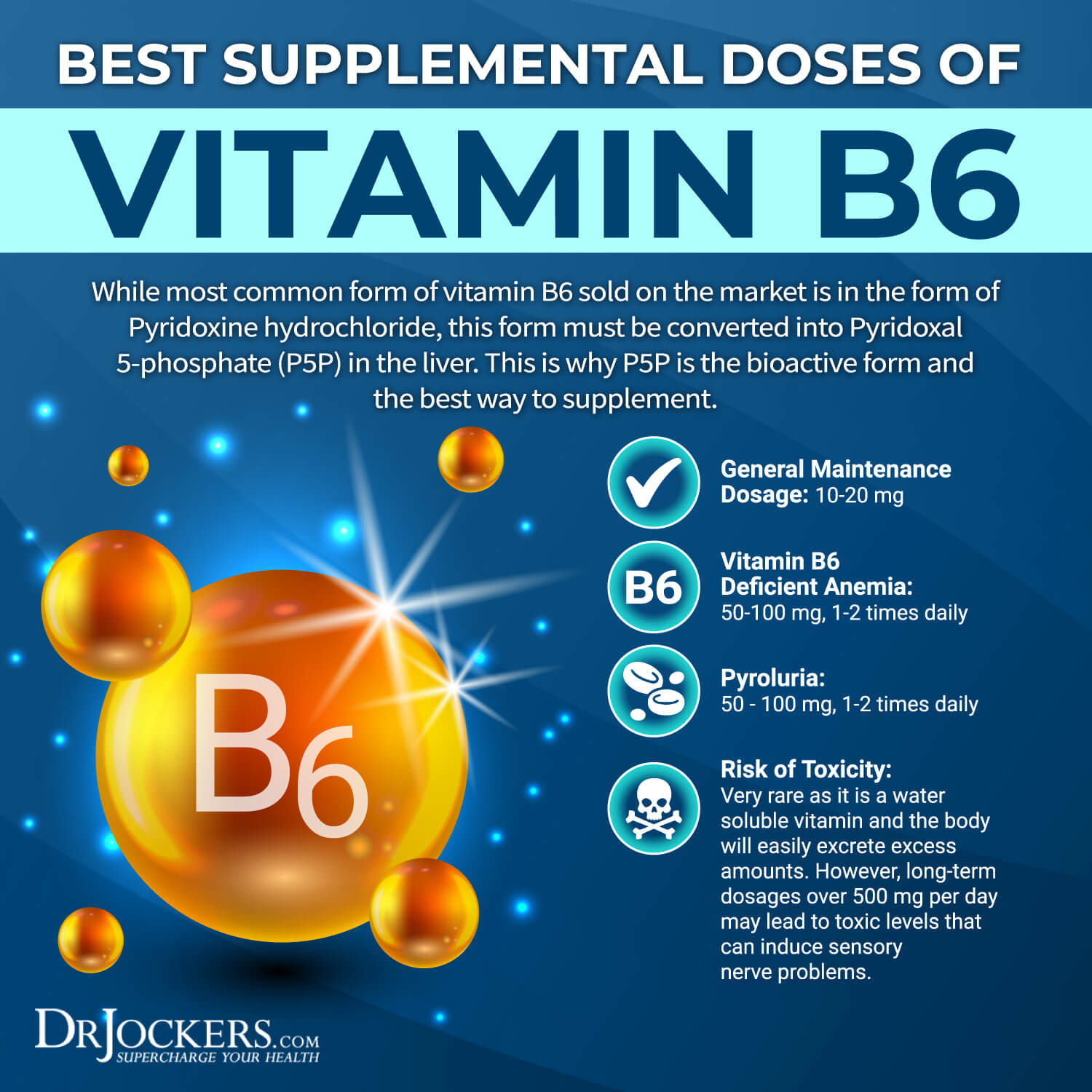
Best Supplement Dosages
I recommend 10 to 20 mg daily for general maintenance. For certain conditions, such as vitamin B6 anemia and Pyroluria, I recommend 50 to 100 mg, 1 to 2 times daily.
Risk of B6 Toxicity
Vitamin B6 toxicity is rather unlikely from food sources alone. Because vitamin B6 is a water-soluble micronutrient, the excess will leave your body through urine. However, long-term, very high dose supplementation of 1,000 mg per day may lead to toxic levels of B6.
Over 1,000 mg per day may lead to sensory neuropathic and sensory nerve damage. Though there are a few reports where under 500 mg per day leads to sensory nerve issues, there is no evidence that keeping under 200 mg per day would cause sensory nerve damage and neuropathy. To avoid any issues, keep at the recommended dosage and work with your functional medicine doctor to ensure proper vitamin B6 levels.
B Strong
If you want to improve your vitamin B6 levels along with other vitamin B levels, I recommend a B vitamin complex called B Strong. This B vitamin complex has a P-5-P form of vitamin B6 for best results and safety.
It also includes other forms of B vitamins, including thiamine (vitamin B1), riboflavin (vitamin B2), niacin (vitamin B3), vitamin B6, folate (vitamin B9), vitamin B12, biotin (vitamin B7), pantothenic acid (vitamin B5), and choline.
B6 Power
For vitamin B6 specifically, I recommend vitamin B6 Power. This is a P-5-P form of vitamin B6 supplement that may help you to reduce deficiencies and improve your health.
Each capsule has 50 mg of vitamin B6 to cover your needs. This is a high dosage so we only use this in cases of pyroluria or after we have diagnosed a B6 deficiency on blood labs or organic acid testing.
Final Thoughts
Vitamin B6, also known as pyridoxine, is one of the B vitamins that your body needs for proper cell function. It is essential for metabolism, brain health, hormone balance, and healthy inflammation levels. Vitamin B6 deficiencies may increase your risk of various health issues. I recommend that you follow my tips and supplementation recommendations to ensure healthy vitamin B6 levels.
If you want to work with a functional health coach, I recommend this article with tips on how to find a great coach. Our website offers long-distance functional health coaching programs with our world-class team of health coaches. For further support with your health and other goals, just reach out—our fantastic coaches are here to support your journey.
Inflammation Crushing Ebundle
The Inflammation Crushing Ebundle is designed to help you improve your brain, liver, immune system and discover the healing strategies, foods and recipes to burn fat, reduce inflammation and Thrive in Life!
As a doctor of natural medicine, I have spent the past 20 years studying the best healing strategies and worked with hundreds of coaching clients, helping them overcome chronic health conditions and optimize their overall health.
In our Inflammation Crushing Ebundle, I have put together my very best strategies to reduce inflammation and optimize your healing potential. Take a look at what you will get inside these valuable guides below!



